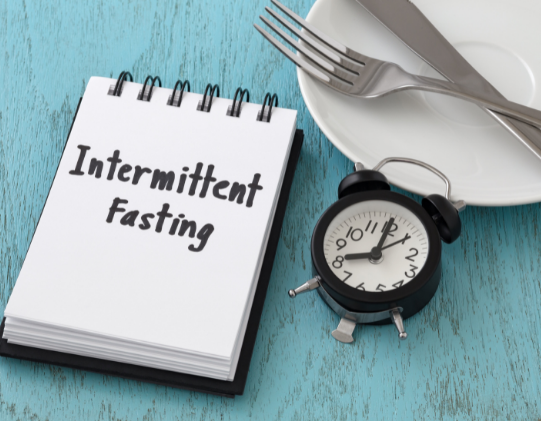
Goals, Mindset, and Resolutions
January 7, 2022
The Paleo Diet: A Primer
March 4, 2022
“I could never go without eating!”
“Fasting leads to unhealthy dieting habits!”
“You will lose your muscle gains if you fast!”
“Skipping breakfast to intermittent fast is missing the most important meal of the day!”
Every time I talk about fasting, I hear some version of the above arguments about why you shouldn’t fast. And each time, my answer to all the above is simply “Not True!”
Once I discovered fasting, I made it a staple in my health routine. I have been fasting for years and have successfully used it as a tool to help reset my gut, lose fat, help gain muscle, and increase ketones.
If you’ve followed my content for long, you’ll know that I don’t just follow one type of fasting but am a proponent of trying a variety and incorporating both intermittent fasting with extended fasting into my routine.
I usually practice intermittent fasting daily and break my fast after about 16 hours. But what exactly is intermittent fasting, otherwise known as IF?
What is intermittent fasting?
IF is a broad term that refers to dietary approaches in which individuals go extended periods of time (typically, 12–48 hours) with little or no caloric intake, with intervening periods of normal intake, on a recurring basis.
Common examples of IF:
- Time-restricted feeding (TRF)
This is the most popular form of IF, which involves restricting food intake to specific time periods of the day, typically 8 hours or less.
- Alternate-day fasting (ADF)
This involves alternating “fasting” days (no calories) with “feast” days (unrestricted food intake).
- Alternate-day modified fasting (ADMF)
This variation of ADF restricts calories to about 75% of your baseline needs on “fasting” days (about 500 calories/day), which are alternated with unrestricted “feast” days.
- Periodic fasting (PF)
“Whole-day fasting” consists of 1–2 days of fasting along with ad libitum food consumption the other 5–6 days of the week.
- Fasting mimicking diets (FMD)
FMD is designed to mimic the physiological state of fasting and provide many of the benefits—without actually fasting.
IF is in the news a lot and often discussed in terms of weight loss but there are many other uses for intermittent fasting.
Top benefits of Intermittent Fasting:
- Weight loss
- Metabolic function
- Heart health and longevity
- Reduced levels of insulin and leptin
- Increased insulin and leptin sensitivity
- Reduced body weight, fat, and visceral fat
- Increased ketone levels
- Reduced resting heart rate and blood pressure
- Increased heart rate variability (a good thing)
- Reduced inflammation
- Increased resistance of the brain and heart to stress
- Improved metabolic function
How does intermittent fasting work its magic?
Scientists now believe that many of the benefits of IF are the result of flipping the metabolic switch. In other words, IF turns off sugar burning and turns on fat burning and ketone production.
Other various health and fitness promoting benefits are:
- Increased parasympathetic activity, reduced heart rate and blood pressure.
- Positive impact on the gut microbiome.
- Aligning one’s circadian rhythm.
One of the big questions as I stated above is, “Is it safe to fast?”
Evolutionarily, humans are designed to withstand periods of abstinence. We’re markedly efficient at storing energy, and during periods of prolonged fasting, it’s very clear that we’re wired to flip the metabolic switch.
Historically, fasting has been used as both a religious and medical practice for thousands of years.
Common Fasting Concerns:
- Does IF promote erratic eating patterns?
- Research shows that IF does not trigger binge eating in those not without previous history.
- Can this hamper my ability to exercise?
- Research shows that people incorporating IF protocols can increase strength and endurance and maintain muscle mass when combined with regular resistance training and cardiovascular exercise.
- Will fasting negatively affect my health in any way?
- In healthy, normal weight, overweight, or obese adults, there is little evidence that IF regimens are harmful physically or mentally. Having said that, if you are pregnant, nursing, at risk for, or are being treated for any medical condition, please consult with your physician prior to making any changes to your diet.
If you haven’t tried IF and think it would be beneficial to you and your body, I recommend giving it a try. You might be surprised how you feel once you start practicing it on a regular basis.
If you’re considering more of an extended fast, I highly recommend it but definitely also recommend doing your research first. I love incorporating an extended fast into my routine but it should always come with a plan and you should be in the right mindset to get the most benefit from it.
If you’ve purchased my book, The ENERGY Formula, make sure you go back to energyformula.com and claim your book bonuses which include a Fasting for ENERGY Guide that has a lot more information and helps you determine your fasting type.
Sending love & virtual hugs to you all!




